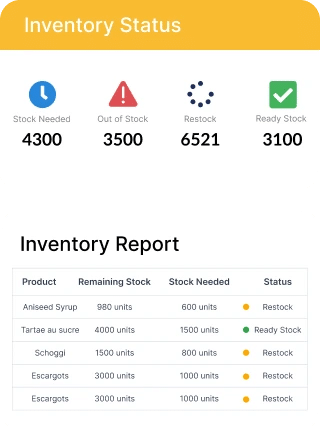In today’s competitive business landscape, effective inventory management is vital in ensuring operational efficiency and customer satisfaction. One approach that has gained significant traction is Vendor Managed Inventory (VMI). But what exactly is VMI, and how can it benefit companies?
By establishing a collaborative partnership and leveraging technology, VMI streamlines inventory processes, enhances order accuracy, and reduces rework. In this article, we will explore the fundamentals of VMI, and its advantages for businesses, enabling companies to thrive in today’s dynamic market.
Table of Content:
Table of Content
What is Vendor Managed Inventory?
Vendor Managed Inventory (VMI) is a supply chain management strategy where the vendor or supplier takes responsibility for monitoring and replenishing a customer’s inventory. In a VMI arrangement, the supplier typically has access to the customer’s inventory data and determines when and how much stock needs to be replenished.
This approach shifts the burden of inventory management from the customer to the supplier, allowing for more efficient inventory levels, reduced stockouts, and streamlined replenishment processes. VMI can lead to improved collaboration between suppliers and customers, reduced inventory holding costs, and better overall supply chain performance.
VMI requires visibility and control through centralized inventory management software. In VMI, suppliers take charge of inventory decisions for retailers, as often found in major companies like Amazon and Walmart. In addition to that, VMI is also known as managed inventory, continuous replenishment program, or supplier-assisted inventory replenishment.
How Vendor Managed Inventory Works
Vendor Managed Inventory (VMI) operates by combining data from suppliers and customers, such as sales and inventory information. Here’s a simplified explanation of how it works:
- A distribution partner provides a Product Activity Report to the VMI system, which includes details on sales, product transfers, and inventory levels.
- The VMI system analyzes this data and generates recommendations for replenishing inventory based on agreed-upon targets and factors.
- The supplier reviews and approves the recommendations.
- The VMI system sends a purchase order (PO) to the supplier electronically through the EDI format, while also sending a PO acknowledgment to the distribution partner.
- The supplier proceeds with shipping the order once the distribution partner approves the PO.
Benefits of Vendor Managed Inventory
Implementing a vendor managed inventory (VMI) system can bring several benefits to companies. This includes:
- Allows suppliers to control downstream decisions, which can contribute to efficient transportation management
- Helps foster long-term relationships with suppliers
- Improves customer experience by avoiding stockouts that can be frustrating for customers
- Promotes transparency by providing information on product origin and manufacturing process, enhancing customer trust.
While VMI offers numerous benefits, companies should also be aware of potential challenges related to communication, cultural resistance, and defining clear lines of responsibility. By leveraging the advantages of VMI and addressing these challenges, companies can optimize their inventory accuracy, forecasting, and service levels.
Disadvantages of Vendor Managed Inventory
While Vendor Managed Inventory (VMI) offers several benefits, there are also potential disadvantages that companies should consider, namely:
- Reduced control: With VMI, the supplier takes on the responsibility of inventory management decisions, which means the company has less direct control over inventory levels and ordering processes.
- Communication challenges: Effective communication and data sharing between the company and the supplier are crucial for successful VMI implementation. Any breakdown in communication can lead to misalignment and inventory inaccuracies.
- Financial challenges: VMI programs often come with substantial administrative costs, such as investing in inventory management software, data analysis tools, and communication infrastructure. These expenses can have a significant impact on a company’s working capital, potentially reducing the funds available for other critical business operations.
- Dependence on supplier performance: Reliance on a supplier for inventory management means that any issues or inefficiencies on their part can directly impact the company’s operations, such as delayed orders or inaccurate forecasts.
VMI Software Recommendation: HashMicro

If you’re looking for reliable vendor managed inventory software for your company, look no further than HashMicro Inventory Management. This fully-featured system offers comprehensive inventory management capabilities, allowing businesses to efficiently manage thousands of inventories with ease. It maintains optimal inventory levels, monitors stock transfers, and optimizes stock management across multiple locations in Singapore.
Some of the key benefits of using HashMicro’s Inventory Management System include seamless inventory tracking, optimized stock levels through low stock notifications and future inventory demand forecasting, an operational dashboard for real-time monitoring of stock movements, and minimized waste by prioritizing the sale of items that have been sitting on the shelves the longest.
The software offers various features such as barcode management, stock request management, and inventory forecasting. It also offers integration with accounting, purchasing, POS, and CRM sales systems. By implementing HashMicro’s Inventory Management System, companies can achieve better control and efficiency in their inventory management practices.
Conclusion
In conclusion, Vendor Managed Inventory (VMI) is an inventory management approach where suppliers assume responsibility for optimizing inventory levels held by distributors. While VMI offers plenty of benefits, it also presents challenges in terms of communication and setting clear lines of responsibility.

Implementing a vendor managed inventory (VMI) system, such as the HashMicro Inventory Management system, can be incredibly useful for companies. HashMicro’s system enables seamless inventory tracking, optimized stock levels, and efficient stock management across multiple locations. Schedule a free demo now and see how HashMicro can benefit your company.



































